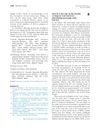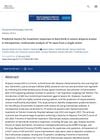 January 2023 in “Przegla̧d dermatologiczny”
January 2023 in “Przegla̧d dermatologiczny” There are two main types of alopecia areata with different severity, and diagnosis is made through clinical examination and trichoscopy, influencing treatment choices.
 44 citations,
November 2016 in “Journal of The American Academy of Dermatology”
44 citations,
November 2016 in “Journal of The American Academy of Dermatology” The updated SALT II tool offers a more precise way to measure scalp hair loss.
 39 citations,
November 2017 in “Journal of The American Academy of Dermatology”
39 citations,
November 2017 in “Journal of The American Academy of Dermatology” The document suggests using standardized methods to track and measure hair loss in alopecia areata, including patient self-assessment and a 50% improvement in specific scores as a treatment goal.
 October 2024 in “Journal of the European Academy of Dermatology and Venereology”
October 2024 in “Journal of the European Academy of Dermatology and Venereology” Ritlecitinib and baricitinib are similarly effective for hair regrowth in severe alopecia areata.
 1 citations,
July 2018 in “Journal of Pakistan Association of Dermatology”
1 citations,
July 2018 in “Journal of Pakistan Association of Dermatology” Microneedling with PRP is a safe and effective way to treat chronic alopecia areata, improving hair regrowth with minimal side effects.
August 2020 in “International Journal of Dermatology and Venereology” PRP is an effective and safe treatment for hair loss in women.

Current treatments for alopecia areata often fail to achieve and maintain significant hair regrowth.
138 citations,
March 2021 in “Journal of the American Academy of Dermatology” Ritlecitinib and brepocitinib effectively regrow hair in alopecia areata patients.
 3 citations,
September 2021 in “Journal of Investigative Dermatology”
3 citations,
September 2021 in “Journal of Investigative Dermatology” Baricitinib was more effective than a placebo in regrowing hair in adults with alopecia areata after 36 weeks.
 January 2025 in “The Journal of Dermatology”
January 2025 in “The Journal of Dermatology” Certain patient traits can predict better hair regrowth with baricitinib in severe alopecia areata.







